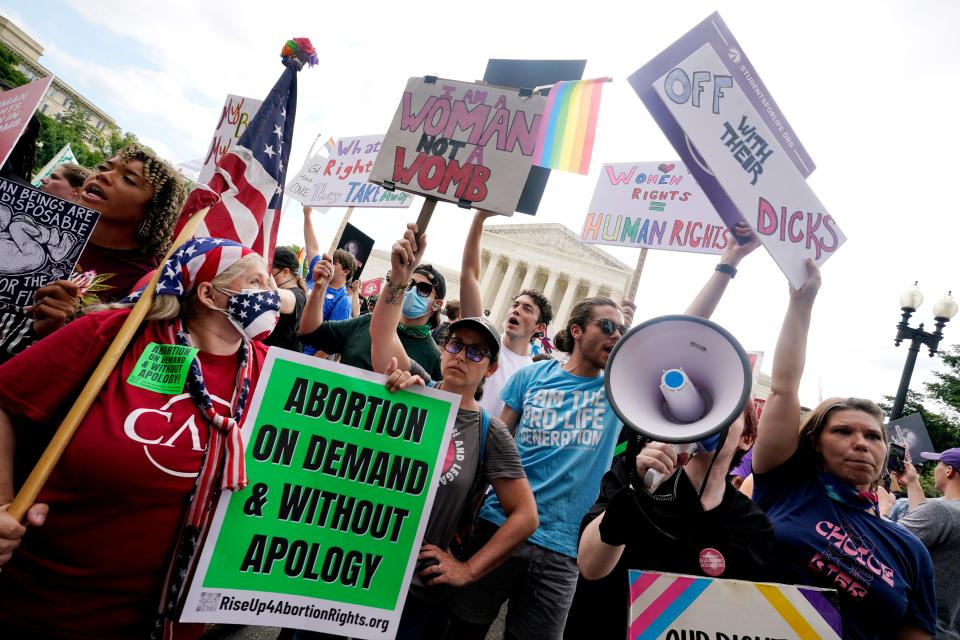Employees, employers find their way after Roe v. Wade decision
Many companies have promised to pay for their workers to travel to unrestricted states for an abortion now that the Supreme Court has overturned Roe v. Wade.
The Supreme Court’s decision Friday has thrown the legality of abortion back to the states, guaranteeing a patchwork of laws across the country. Some states are outlawing abortion, while others promise to be sanctuaries and some may opt for something in between.
How companies decide to accommodate employees needing an abortion remains up in the air for many.
In the meantime, here are some things we do know about how to navigate having an abortion and your job.
Who do you ask at your company about abortion policies?
Like any other health benefit question, you can either go to a human resources manager or your health care provider.
If you were issued a health insurance card, there’s often a phone number you can call to speak to a representative who can walk you through your benefits. That includes how your company’s policy covers abortions, and if so, what the terms of your coverage are.
Does your health insurance cover abortion and if so, how much is it?
States already have requirements for health insurance companies on abortion coverage.
Six states require abortion coverage in health insurance plans, but 11 states prevent all plans – including employer sponsored plans – in the state from offering abortion coverage as part of a comprehensive health care plan.
Other states, except Louisiana and Tennessee, are somewhere in between, allowing coverage with some restrictions either on plans or instances for which it’s covered. Louisiana and Tennessee do not allow abortion coverage even in health- or life-threatening circumstances.
The cost of the coverage, if included, is accounted for in what you pay for the health plan.

Do corporations in multiple states have different policies?
Generally, companies with offices in different states will offer the same health plans for everyone.
Health plans are covered by the Employee Retirement Income Security Act, which preempts state laws, meaning that plans don’t have to be different in each state. But just because the health plan may cover abortion care as a covered benefit does not mean that an employee or dependent could obtain one in a state with restrictive laws.
The act does not preempt local laws, said Allison Sizemore, attorney at Reed Smith.
What to ask your company if it pays for employees to travel for abortions
Employers providing travel for abortions to unrestricted states probably would go through a third party, and all health-related privacy laws would have to be adhered to, said Laurie Sobel, associate director for women’s health policy at the nonprofit KFF.
But how meaningful the travel promise will be depends on the details. Is abortion covered, and if so, are there any restrictions? Is there cost sharing, and if so, what’s the deductible? Sobel said some fully insured plans require coverage with no cost sharing.
MAKING SENSE: What does overturning Roe mean? A breakdown of the Supreme Court's abortion ruling.
EVERYONE FEELS IT: Emotions stir as the country reacts to the SCOTUS decision to overturn Roe v. Wade
“The trickiest part will be the network,” she said. “Is the out-of-state clinic in the network, and how will it be billed? Will the clinic bill directly to the insurance company, or will I have to pay out of pocket and submit receipts for reimbursement? Because if that’s the case and I couldn’t afford it then, how am I going to afford it now?”
Some companies already have in place plans for employees who have to travel across state lines for medical care to "centers of excellence," or health care institutions for specialized, expert care, such as cancer centers. They can use those as blueprints to plan abortion coverage, experts say.
Can companies be sued for paying for an employee to cross state lines?
That has yet to be determined.
Most state laws – actual and potential – seem to penalize abortion providers or clinicians. But that could be tested in months ahead, said Sarah Raaii, attorney at McDermott, Will & Emery.
But one saving grace, she said, is in Justice Brett Kavanaugh’s opinion.
“May a state bar a resident of that state from traveling to another state to obtain an abortion?” he wrote in a concurring opinion. “In my view, the answer is no based on the constitutional right to interstate travel.”
Raaii said that “people may be able to point to this for some support.”
What about fertilized eggs and in-vitro fertilization treatments?
That is also to be determined, depending on how states define an unborn child.
“So far, state laws have been broadly drafted so they could affect fertility treatments,” Raaii said.
MORE THAN ABORTION: Not just abortion: Overturning Roe v. Wade puts your right to conceive babies at risk, too
LESSONS FROM THE PAST: Political history of Supreme Court abortion cases
Sobel added: "People do have embryos that are stored, and more than one fertilized egg is placed in IVF treatments because it’s more cost-effective and increases your chance of getting pregnant. What happens if people are pregnant with more than one embryo, and for safety reasons there needs to be a reduction. Where does this fall?”
Medora Lee is a money, markets, and personal finance reporter at USA TODAY. You can reach her at mjlee@usatoday.com and subscribe to our free Daily Money newsletter for personal finance tips and business news every Monday through Friday morning.
This article originally appeared on USA TODAY: Employees and employers after Roe v Wade decision: What we know

